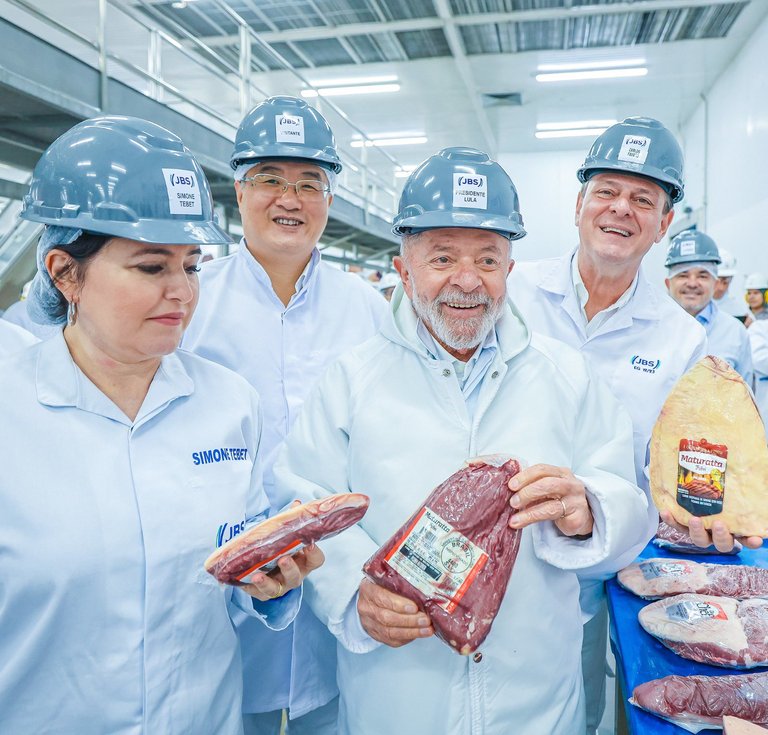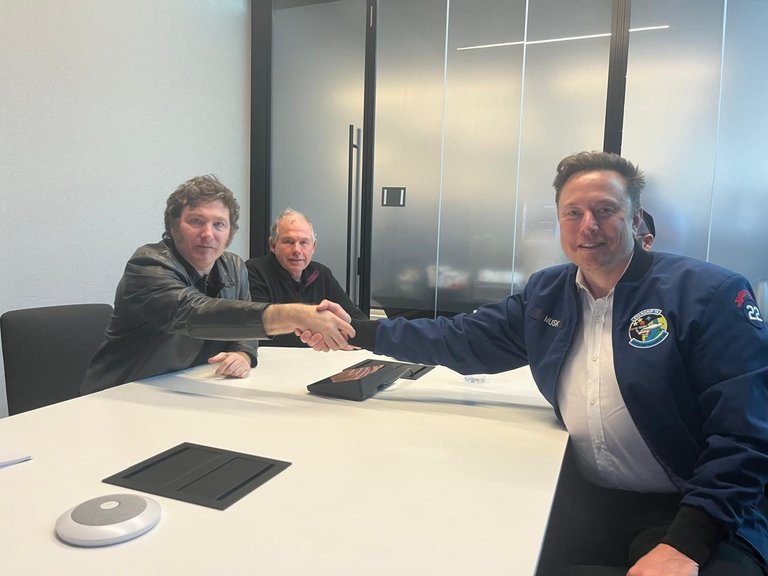
Priorities
Last Friday, during a visit by President Lula da Silva to its facilities, JBS, the world's largest beef processor, announced that it will invest close to US$ 30 million to double production capacity at one of its units, located in the strategic state of Mato Grosso do Sul. Following this boost, the Campo Grande II beef plant—which has access to the Chinese market—is expected to slaughter 4,400 cattle daily. On a positive note, the workforce will grow at the same rate as the plant's processing capacity. Lula celebrated the linkage between Brazilian production and the absorbing Chinese market. "It is a joy for the Chinese, who recognize that they are going to eat quality meat, and for us that we are selling them more", said the seasoned union leader, who was able to witness the first shipment to China from Campo Grande II. This year, adding the contribution of about 40 companies approved in 2023, the volume of Brazilian meat exported to China is estimated to grow by 24% and cross the barrier of 10 billion dollars annually. The head of the Palácio do Planalto exalted his work as a promoter of Brazilian products around the world, opening 105 new markets for its agricultural exports. "I travel the world to sell Brazilian products," he said.
 Ambassador Zhu Qingqiao and President Lula in the JBS plant (source).
Ambassador Zhu Qingqiao and President Lula in the JBS plant (source).Meanwhile, Argentine President Javier Milei was in the United States this week, from where he urgently returned to install a sort of task force after the limited Iranian military response to the deadly bombing of its consulate in Damascus on April 1. The press reported extensively on his meeting with Elon Musk, who has been quite present in the region's politics these days. In the Brazilian case, for example, a crisis has arisen due to the judicial actions of a controversial judge involving X, which particularly make its Brazilian assets vulnerable. The case has much to do with the endless and subjective discussion on how to address online disinformation or how much freedom of expression fits in platforms such as the "old" Twitter. In the Argentine case, Musk's landing is not contentious, since the alluded bromance he would have with Milei, which was cemented—overcoming the digital dimension—after their business and ideas meeting last Friday in Austin, Texas. Incidentally, X's conflict with Brasilia was addressed there, and Milei pledged "support".
The agenda they addressed included Argentina's potential as part of the so-called "lithium triangle", which it forms together with Bolivia—the largest reserve in the world—and Chile. The political-ideological balance of each government conditions those who can invest in their internal markets. In La Paz, for example, Chinese capital has been privileged, as in Chile. Milei appeals to other [ideological] lenses. "We talked about investment opportunities in Argentina in lithium and the importance of studying investments in lithium and generating added value. We are very committed not only to exporting raw materials but also to adding value. [Musk] said that he wants to help Argentina", said an attendee to the meeting between Milei and the mogul. "We agreed to work along these lines and see what opportunities may arise for lithium and to process lithium at a later stage, either in batteries or in the production chain", he added.
 Source
SourceSo, according to LN+ channel—very close to Milei's inner circle—, the Argentinean libertarian leader sees Musk's technological ecosystem as an ally to fight certain internal battles. For example, if we talk about his conflict with a powerful media-oriented business group such as Clarín, the Pink House is betting on bringing competition into the market by enabling Starlink. If we are talking about its confrontation with the critical union that hosts truck drivers, the most zealous sentinel of the free market would be counting on Tesla's autonomous truck models. Milei, who has already made administrative decisions to favor the arrival of Musk's business on both fronts, was also spotted in a Tesla Cybertruck pickup. Both agreed on "the need to free markets" to attract investors, and agreed to hold a "big event" in Argentina to spread "the ideas of freedom".
🚨Javier Milei en el Tesla Cybertruck
— Tv Pública Libertaria (@Tv_Libertaria) April 12, 2024
✅Estuvo manejando un rato luego de reunirse con Elon Musk pic.twitter.com/i7UnIULiBb
What's left for the people?
When I titled this cover commentary Priorities, what I wanted to refer to is how these initiatives promoted by two Latin American presidents connect—or not—with the most urgent needs of their countries. In the case of Lula, there is a bet on the "spillover effect", but we would have to start discussing if the problem of beef consumption—or hunger in general—is solved within the country, and especially for the most vulnerable strata. For example, since 2021 the dynamics of reducing red meat consumption has been accentuated. While exports rose, in the country with the second world's largest livestock mass many people already discarded them in their purchases, although it has also been clarified that part of the change in consumption patterns is due to nutritional criteria. Towards the end of Jair Bolsonaro's term of office, it was reported that poor Brazilians were begging for meat bones in small stores and fighting with scavengers for the "best" leftovers in landfills. Nonsense considering the productive potential of the largest South American economy, which supplies food to 800 million people but is not able to provide for more than 125 million of its natural consumers.
In the case of Argentina, the logic is that more investment means more growth. The problem, always, is who grows. As I have explained here many times, Javier Milei's social mapping only reaches the middle class. He has made explicit that the model he defends and intends to apply in an orthodox way has fewer poor people. In other words, misery is naturalized. From the severe context of deprivation experienced by many Argentines, Elon's Cybertruck, his Starlink system, or the potential returns that his landing in the Argentine salt flats would leave for the country, end up being projects or discussions from another planet or dimension. There is a huge disconnection between Milei's economic and symbolic priorities and those of the most affected by his adjustment policies. Between the smiles and positive energies emanating from his bromance with the CEO of X and the dengue fever that has hit the country hard this year—as well as others like Perú—, with 36 deaths reported last week alone. Between the libertarian's thumbs up—a trademark of this right-wing populist when posing for photographs—and the pepper spray, rubber bullets, and hydrant trucks used to repress those demanding supplies for soup kitchens.
 A demonstrator holds a doll satirizing Javier Milei during one of the many protests that have taken place between March and April over his government's massive layoffs and other austerity measures (source).
A demonstrator holds a doll satirizing Javier Milei during one of the many protests that have taken place between March and April over his government's massive layoffs and other austerity measures (source).In this sense, I was interested that a media outlet like La Nación reflected these distortions. "Argentina's main priority today is to generate money. And Milei's presidential tours are more ordered around his symbolic and personal preferences than the economic needs of the country", a respected academic told the newspaper. Returning, finally, to the lack of correspondence between the productive capacity of countries like Brazil or Argentina and the food shortage suffered by many of its citizens, I refer to what was recently expressed by a renowned intellectual uncomfortable for both left-wing and right-wing rulers. "Half a century ago, in the most important historical moment that history has ever recorded, the world reached, for the first time, the capacity to feed all its inhabitants. Now our species can produce food for 12,000 million; we are 8,000 and, even so, there are almost 1,000 million who do not eat what they need. But Argentina is an extreme case of this extreme shame: in a country that is basically dedicated to producing food—that supposedly can produce it for 400 million people—, four or five of its 45 million inhabitants go hungry. Especially its children". However, let's hope that after JBS exports much more meat to Beijing, and the Buenos Aires caste can run a Cybertruck through the capital avenues, Brazilians and Argentines of all classes will have at least something decent to eat three times a day.
And this is all for our report today. I have referenced the sources dynamically in the text, and remember you can learn how and where to follow the LATAM trail news by reading my work here. Have a nice day.
